Getting Grandparents on Board with Real Food
I know a lot of you deal with parents and in-laws who are not quite so open-minded. I thought it would be fun to interview my mother-in-law, Nancy, and learn about how she got converted to real food.

I have the best in-laws in the world. Nancy and Ed are in their 70s and have ten times more energy than most people half their age. They’re very optimistic, outgoing, fun-loving, generous and caring. I’m grateful every day for Bubbe & Papa!
I gave birth to my daughter Kate four years ago. I discovered “real food” when I found the Weston A. Price Foundation when she was five months old (thanks to my Great Uncle Roy for sending me the link!).
My in-laws got on board very quickly. To this day they eat a very healthy diet including lots of raw milk, grass-fed dairy and meat, and they supplement with cod liver oil and probiotics.
I know a lot of you deal with parents and in-laws who are not quite so open-minded. I thought it would be fun to interview my mother-in-law, Nancy, and learn about how she got converted to real food. I also asked her to share her ideas about how to help grandparents get on board with healthy eating.
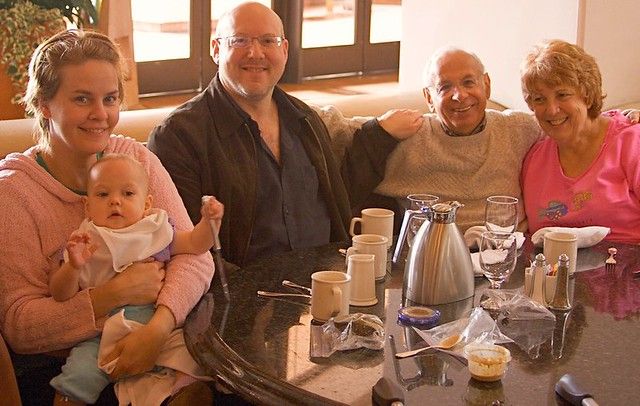
Getting Grandparents on Board with Real Food: An Interview with Kate’s Bubbe, Nancy
Ann Marie: How have you changed your diet since I came into your life?
Nancy: So many ways. We now buy raw milk, pastured eggs, grass-fed beef, wild-caught fish. We use coconut oil and butter for cooking. We switched to honey, maple syrup and stevia as sweeteners. We don’t drink soda anymore and I’m off caffeine. I drink herbal tea now. We take fermented cod liver oil, high-vitamin butter oil and probiotics every day.
We also make our own salad dressing now. We used to have 15 bottles of salad dressing. Now I buy olive oil from Chaffin Family Orchards and I make my own vinaigrette. I make my own mayonnaise and make Russian dressing. Ed likes his salad drowned, so if he’s drowning it, he’s got to have good oil.
It started out wanting to support what you had chosen to do for Kate but then it wound up being about our health as well. I’m 70 and Ed is 79 and we’re not on any prescription drugs.
Ann Marie: Were you on any prescription drugs before?
Nancy: I used to be on Lexapro. I read The Mood Cure by Julia Ross, got off caffeine and aspartame, and was able to get off that. I also used to Xanax occasionally to help me get to sleep but I don’t take that anymore.
The doctor put me on a statin for a few months and after talking to you about the dangers of statins, we changed doctors and we now go to an osteopath who is more into wellness and preventive health. She worked with me and I got off the statin.
Ed was put on on Protonix after he had a hernia. The doctor had him on it for acid reflux. We learned from the new doctor, the osteopath, that he needed to get off of it because it blocking vitamin B absorption. His B levels were very low.
He was taking a variety of over-the-counter antacids as well. At your suggestion I started making him a kefir smoothie every day and he began taking probiotics. He’s off all the medication now. He no longer has any difficulty with his stomach and his vitamin B status is good.
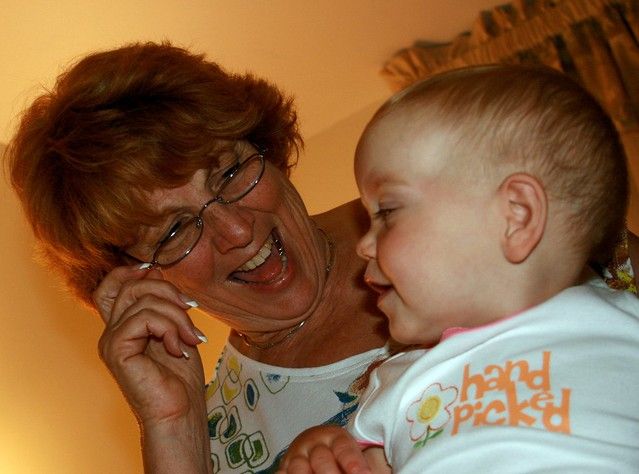
Ann Marie: Was it hard to make all these changes?
Nancy: We really didn’t make all of them at once. It happened gradually over the past four years. It started with the raw milk for Ed.
Ann Marie: Oh, that’s right. I remember. Ed was drinking soy milk and I saw it in the fridge and asked him why it was there. He said he couldn’t digest milk; it didn’t agree with him. I told him why soy is bad for you and suggested he try raw milk.
Nancy: Right, but since we live in New York, we didn’t know where we could get raw milk. So you looked online and found a source for us. We’ve been drinking raw milk since then.
Ann Marie: Is it difficult for you to get raw milk?
Nancy: No, we go every other week. We put our order in on the computer. Sometimes we go once a month because I store milk in the freezer. When Kate’s here, we go though a lot more milk and eggs. We also get lots of cream when Kate is here so I can make ice cream for her.
I don’t understand why anyone wouldn’t make these changes at least while their grandchildren are visiting. Because it’s supporting their health and their future.
But the benefit has really been that our health has really improved and we can travel and do all the things that we love to do because we are healthier.
When we talk to our friends about it, they all think it’s too expensive and too difficult and they’re locked in by not wanting to make any changes. Some have made changes and they have benefited from them. Others tend to be locked in to the way they’ve always done things and they’re limited by it.
I don’t think this is a function of age; I think young people are the same way. But I think as you get older, you tend to be more fixed or rigid in your way of thinking. I have always believed that if you don’t grow and change, you’re not really living.
So much of this makes sense because there are so many chemicals and additives in our food. As a teacher for 32 years, I saw our school going from one asthmatic child going to 15-20% of the kids using inhalers, on Ritalin, or having other major health issues. Autism is an epidemic. Our children are overweight, have short attention spans, don’t exercise, and don’t seem to have the joy of learning that they once did.
I don’t know how much of this is based on poor nutrition or other factors, but I really believe now, learning what I’ve learned and seeing the changes in us, that the poor nutrition our children have is really impacting their future and their lives.
When I look at Kate with other four-year-olds, I am impressed by how solid and sturdy she is. She’s bigger and healthier than other kids and has a tremendous zest for life. How could I not support this?

Ann Marie: What would you say to someone whose in-laws or parents are having trouble getting board with healthy eating, or even worse, sabotage them in them efforts to change their diet?
Nancy: The first thing you have to know is that it’s probably a control issue. I remember when my son was an infant, having a huge fight with my mother-in-law over which way the safety pin went into the diaper, whether it was vertical or horizontal. I have no idea which position I took at the time because it wasn’t about the safety pin. I was asserting that I was the mother and it was my decision to make.
Once you realize that it’s about a power struggle, it’s much easier to figure out how to deal with it. Talk to your mother or mother-in-law when you’re not emotional and explain what you believe in and why you are doing what you are doing. Tell them you need help. That you’re fighting against a society that keeps giving them food that is not healthy all the time. There are many ways that they can give their grandchildren treats — as I do — that are healthy. When Kate is at our house, she is overindulged with sweets.
Ann Marie: But that’s OK, because it’s not all the time.
Nancy: And every treat she gets is healthy. I make your chocolate chip cookies, creamsicles, homemade ice cream, blueberry coconut flour muffins. I make it all ahead and keep it in the freezer so when Kate arrives she knows what goodies she’s going to have at Grandma’s house.
I also make her “crabby patties” (hamburgers from grass-fed meat,) wild shrimp, pastured chicken, grass-fed steak, Australian lamb chops, potatoes fried in coconut oil, organic vegetables with loads of butter, and other nutritious foods.
Once the grandparents understand that they can provide healthy treats and know what to do, they will be very happy to do it. Part of being a grandparent is wanting to indulge the child without the consequences you have when you’re the parent. If grandparents can understand what ways they can do that and still be supportive of good nutrition and the benefits for their grandchildren, why wouldn’t they do it?
I realize that I had it a lot easier than most grandparents because I was able to read your blog, use your recipes, and see photos of Kate regularly on the blog. It might be a good suggestion for the grandparents if they are computer-literate, to read the Real Food Media blogs. That would help them learn. If you give them the tools, maybe that will help. Just saying you don’t want them to do something isn’t enough. You have to explain how to do it, how they can help.
Ann Marie: You have to educate them.
Nancy: Right.
Ann Marie: I was using my blog to educate you without realizing it.
Nancy: Right. See, I just don’t get why anyone would sabotage good nutrition by taking their grandchildren to McDonald’s. I just don’t get it. It’s all about wanting the grandchild to love you and relate to you. You can do that without undermining the parents. I would think you’d really want to support the parents if you believed in what they were doing.
Ann Marie: But I think that’s the key. A lot of grandparents out there don’t believe because they don’t know any better.
Nancy: They haven’t been educated.
Ann Marie: So the key is education.
Nancy: And also not having a hissy fit when grandparents do something they don’t like. Try to see it from their point of view. They’ve been doing something for 60 years and you’re trying to tell them they’ve been doing it wrong. That’s where the challenge comes in. It’s not all about the food. It’s about power struggles. It’s about wanting to be right.
Young mothers want to be in charge of their children. As they have every right to be. But grandparents tend to think, I’ve been doing this all my life and I know better than you. The grandparents are stupid if they don’t realize that the parents have the control over the child.
Once you realize it’s a power struggle, how are you going to change it? By becoming more dogmatic, you’re only going to escalate the power struggle.
So at some point, somebody has to be the adult and say it doesn’t matter which way the safety pin goes. What matters is the parents decide what’s good for the child. The grandparents spoil them in a way that’s not detrimental to the child, or to the child’s relationship to the parents.
The end result for me is that Ann Marie and Seth want Kate to spend more time with us, not less. So who wins? I do, because I can have a real loving relationship with my grandchildren and that’s what matters.
Ann Marie: Not to mention the loving relationship you have with us, the parents.
Nancy: Yes.
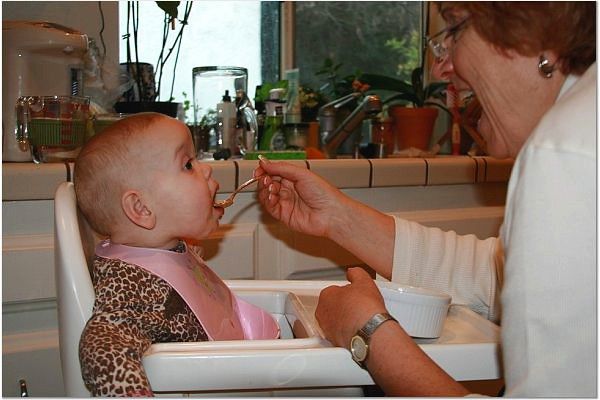
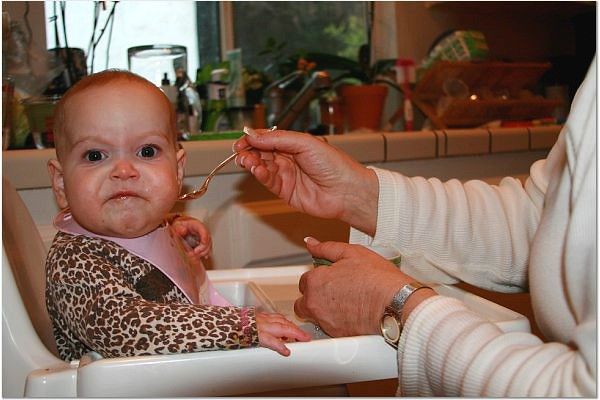
Ann Marie: You’re a retired teacher. What are some ways parents can educate grandparents about food?
Nancy: One thing I will tell you is that grandparents don’t like being told what to do. They’re used to being the parents and they don’t like that role reversal.
Change doesn’t happen rapidly. Change happens slowly. Whether sweetening with maple syrup is the first step, or getting raw milk in the house for the children. One step at a time.
When you’re telling somebody what to do, you’re saying that they’re wrong and you’re right and you know better. No one likes to hear that or feel that way.
When you show them or explain to them what you’re doing, or why you’re doing it, it’s not telling them. It can’t be telling them. It can’t be dogmatic. It’s got to be on a peer level. It can’t be like you’re the teacher and they’re the child. That never works.
The best teaching method in the classroom is modeling. When you demonstrate something, then the child can follow it. It’s much more effective than lecture, or giving them a set of directions. If you show them, and model it, and demonstrate by thinking aloud… if you share with them how you’re thinking about it. Then as you’re physically doing it and showing them, that’s how they learn to do something.
The same is true when you’re teaching adults. If you model your thought process and how you got to where you are, it’s a much more effective method of teaching.
Ann Marie: So give me an example.
Nancy: When cooking together, it’s a perfect opportunity to say things like, “I’m using maple syrup because this is a natural sweetener and it tastes good but it’s not bad for you. How much do you think we should put in?” That’s a good way to teach that most foods are too sweet, and why unrefined sweeteners are better.
Ann Marie: What else?
Nancy: It might be fun, if the children are older, to have them cooking with the grandparents. You can have the children explain to the grandparents. Most social situations involve food so there are lots of opportunities for food preparation.
Ann Marie: If you were a parent again, knowing what you know, what would do to help your parents or in-laws understand?
I think the first thing I would do is try to do it with a sense of humor and love and warmth. I did realize after the safety pin incident what was happening. And I did have a very good relationship with my mother-in-law — or as good as we were capable of having — because I never got into another power struggle with her again. So the one thing I would avoid at all costs is ever engaging in any power struggles. Because everyone loses. Power struggles result in anger, hurt feelings, sadness, and are just not conducive to warm, loving relationships which is what we all want.
So I guess what I’m saying is, I would try to understand the issues the grandparents have and be respectful of them.
Ann Marie: Like maybe a tight budget?
Nancy: Yes, limited finances, if that’s the case. And try to have them understand that it’s a lot better to spend more money on good olive oil and good meat than doctors and prescriptions.
But you have to first understand where they’re coming from. And be respectful of that.
Ann Marie: And then you can overcome their objections.
Nancy: I think the key word here is respect. There has to be respect on both sides as to what each has to contribute. You can learn from the grandparents nad the grandparents can learn from the parents. If there is open communication and no judgements, it just promotes healthier relationships all around. And what a great model for the grandchildren.
Ann Marie: So what do you do when the grandparents feed the kids McDonald’s or high-fructose corn syrup?
Nancy: It’s not going to hurt them if they have it once in a while, if they’re eating healthy foods most of the time.
If you treat it with anger or resentment, it’s only going to cause bigger problems. If you make a big issue out of something, it makes it bigger. If you can try to understand why they’re taking them there, you can help them to understand that there are better things they can do to help their grandchildren.
I’m no therapist, but the kids are going to want to try McDonald’s because they live in a society where everyone eats McDonald’s. It has to be an education process. I think you can ask the grandparents to please not take them to McDonald’s but you can’t ask them to not give them treats. I think you can ask them to give them healthy treats and show them how to do that.
It’s all about a contest for the child’s love. It should be about a contest for doing the most for children because children can never have too much love.
Share Your Comments Below
What’s your experience? Do you have a tough time with your parents or in-laws when it comes to food?
Are holidays and family get togethers a struggle for you? Or do you have parents and in-laws who support you in the way you feed your children?
Please share your comments below.

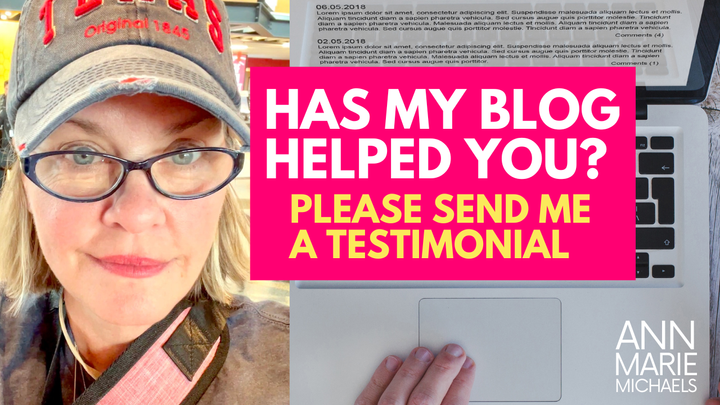
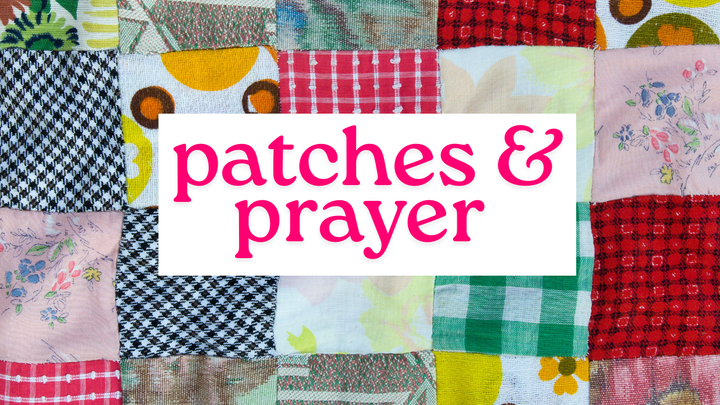
Comments ()